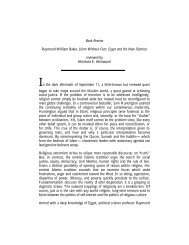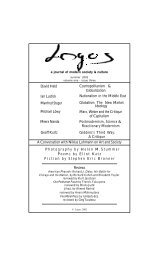Michael J. Thompson Stephen Eric Bronner Wadood Hamad - Logos
Michael J. Thompson Stephen Eric Bronner Wadood Hamad - Logos
Michael J. Thompson Stephen Eric Bronner Wadood Hamad - Logos
Create successful ePaper yourself
Turn your PDF publications into a flip-book with our unique Google optimized e-Paper software.
Stanley Aronowitz<br />
student of social movements; his writings span analyses of the labor<br />
movement, the student left, the peace movement and others. He swam,<br />
intellectually, against the current, yet unlike many independent leftists who<br />
saw only defeat in the post-war drift toward militaristic-corporate political<br />
economy and despaired of relevant political practice, he was, above all, a<br />
practical thinker whose interest was always to describe the “main” chance as a<br />
dead end and to counterpose the chances for leftward social change.<br />
Consequently, even when he is the most descriptive of, say, labor leaders, and<br />
portrays the new middle class in terms of subordination and as allies of the<br />
leading élites, his eyes never strayed far from the question of “ what is to be<br />
done?” What are the levers for changing the prevailing relations of power?<br />
How can those at or near the bottom emerge as historical subjects?<br />
Mills is aware that to reach beyond the audience of professional social scientists<br />
he is obliged to employ a rhetoric that, as much as possible, stays within<br />
natural, even colloquial language. Addressing the general reader as well as his<br />
diminishing audience of academic colleagues, Mills conveyed often difficult<br />
and theoretically sophisticated concepts in plain, but often visual prose,<br />
described by one critic as “muscular.” And, perhaps most famously, he was a<br />
phrasemaker. For example, his concept of the “main drift” to connote<br />
conventional wisdom, as well as centrist politics encapsulates in a single phrase<br />
what others require paragraphs to explain. And, instead of using the Marxianloaded<br />
term “crisis” or the technical dodge “recession,” to describe conditions<br />
of economic woe he employed the colloquial “slump.” He characterizes the rise<br />
of industrial unions after 1935 as the “big story” for American labor, a term<br />
which encompasses history and common perception. But the imperatives of<br />
the Cold War—especially the emergence of the military as a dominant<br />
institutional order—constitutes the big story of the immediate post-war era.<br />
Mills wrote scholarly works but, in keeping with the style of a public<br />
intellectual, he was also a pamphleteer, a proclivity that often disturbed his<br />
colleagues and, in one of the more odious forms of academic hubris, led some<br />
to dismiss him as a “mere journalist.” In fact, this dismissal may, in addition to<br />
his boldness in attacking the big themes of social theory and analysis, account<br />
for the sad truth that since the late 1970s his major works are virtually unread<br />
in social science classrooms, have disappeared from many scholarly references,<br />
and are largely undiscussed in the academic trade. In the last decade of his life,<br />
<strong>Logos</strong> 2.3 – Summer 2003




